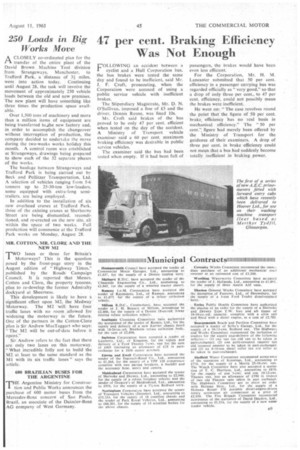Was Not Enough
Page 43

If you've noticed an error in this article please click here to report it so we can fix it.
VOLLOWING an accident between a
cyclist and a Hull Corporation bus, the bus brakes were tested the same day and found to be inefficient, said Mr. J. F. Croft, prosecuting, when the Corporation were accused of using a public service vehicle with inefficient brakes.
The Stipendiary Magistrate, Mr. D. N. O'Sullivan, imposed a fine of ES and the driver, Dennis Rouse, was lined 10s.
Mr. Croft said brakes of the bus proved to be only 47 per cent. efficient when tested on the day of the accident. A Ministry of Transport vehicle examiner said a 60 per cent, maximum braking efficiency was desirable in public service vehicles.
The examiner said the bus had been tested when empty. If it had been full of passengers, the brakes would have been even less efficient.
For the Corporation, Mr. H. M. Lancaster submitted that 50 per cent. efficiency in a passenger carrying bus was regarded officially as "very good," so that a drop of only three per cent., to 47 per cent, efficiency, could not possibly mean the brakes were inefficient.
He went on: "The case revolves round the point that the figure of 50 per cent. brake, efficiency has no real basis in mechanical efficiency." The " 50 per cent.", figure had merely been offered by the Ministry of Transport for the guidance of their examiners. A drop of three per cent, in brake efficiency could not mean that a bus had suddenly become totally inefficient in braking power.




















































































































